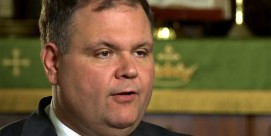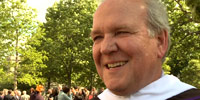In This Episode << SLIDE LEFT TO SEE ADDITIONAL SEGMENTS
2008 Campaign: What’s Appropriate?
BOB ABERNETHY, anchor: Religion has played an unusually prominent — and controversial — role throughout this campaign season, raising the question: What are the appropriate boundaries between religion and politics? Kim Lawton has our report.
Reverend LOUIS HUSSER (Pastor, Crossgate Church, Robert, LA, during sermon): What is right always outweighs what is wrong. Can I get an “Amen?”
KIM LAWTON: “Citizenship Sunday” at Crossgate, an evangelical church in Robert, Louisiana. God and country are the order of the day. There’s lots of patriotic music, a push to register new voters, and a sermon called “What’s Right with America?”
Rev. HUSSER (during sermon): Celebrate the freedom that we have as Americans, because it’s a God-given freedom. If you agree with that, can I get an Amen?
LAWTON: Pastor Louis Husser stresses that the Citizenship Sunday efforts at his church are all nonpartisan. He believes people of faith have a moral obligation to be involved in the political process.
Rev. HUSSER: One of the challenges with Americans is that we have been sold this idea that you separate politics from your faith and nothing could be farther from the truth.

Louis Husser |
LAWTON: But determining the proper relationship between religion and politics has long been a tricky business. From the earliest moments of the primary season, the situation this election cycle has been more volatile than ever.
Reverend C. WELTON GADDY (President, Interfaith Alliance): We’re in the midst of a political marketplace that is infused with religion. And there is a highly charged discussion going on, and sometimes you can’t tell the politicians from the religious leaders.
LAWTON: Both the Democrats and the Republicans are reaching out to people of faith in organized and unprecedented ways. Campaigns are seeking — and repudiating — clergy endorsements, while political activists are digging for dirt in the candidates’ spiritual connections. And in the midst of it all, controversies are heightened in a nonstop digital information age.
Professor CLYDE WILCOX (Department of Government, Georgetown University): I can’t really articulate where the line is, but I think in some ways, maybe we have crossed a line that’s important that we rethink.
LAWTON : The IRS has set up a few guidelines. Churches and other religious groups that get a tax exemption may not get involved in the campaigns of individual candidates or engage in partisan politicking. Clergy may not endorse candidates from their pulpits, although they can make endorsements as private citizens. But there are a lot of gray areas. And for many, the question is not just what’s legal, but also, what’s moral?
Rev. GADDY: It is not what can I do? It’s what should I do as the leader of a house of worship or as a candidate for the presidency of the United States?

C. Welton Gaddy |
LAWTON: The issue of clergy endorsements has been particularly controversial this time around. To what extent should a candidate be accountable for everything his or her endorser has said and done? John McCain sought the endorsement of evangelical megachurch pastor John Hagee.
Senator JOHN MCCAIN (R-AZ, during speech at CUFI): And I thank you for your spiritual guidance to politicians like me who need it fairly often. It’s very hard to do the Lord’s work in the city of Satan.
LAWTON: Then political activists discovered controversial past comments Hagee made about Catholics, and about the Holocaust. Those comments flew around the internet. Hagee said his views were being distorted and unfairly attacked, but McCain ended up rejecting his endorsement. McCain also distanced himself from another endorser, Ohio pastor Rod Parsley, over past comments the evangelical leader made about Islam. Parsley said his sermons had been quote “turned into political weapons.”
Prof. WILCOX: When a religious leader makes a political endorsement, then they have entered into the political arena and they have subjected their past views, public — you know, and as much as we can know of the private ones — to some kind of scrutiny, which is one of the reasons they should think twice about political endorsements.
Rev. GADDY: Whoever plays in politics is going to be involved in hardball politics and that shouldn’t be a surprise, especially when the stakes are so high.
LAWTON: Meanwhile, do clergy have the right to criticize who their parishioners endorse?
Douglas Kmiec is a prominent professor of constitutional law at Pepperdine University. An official in the Reagan administration, Kmiec is a well-known opponent of abortion. Many fellow Catholics were shocked when he announced his support for Barack Obama who’s pro-choice. Then a priest denied Kmiec Communion because of his endorsement.

Douglas Kmiec |
Professor DOUGLAS KMIEC (School of Law, Pepperdine University): Every time I stand in the Communion line now, I have a memory of walking up to my priest and being denied. I think that memory will be with me like a car accident for the rest of my life.
LAWTON: Los Angeles Cardinal Roger Mahony called the denial “shameful” and “absolutely indefensible” as a matter of Canon law and Church policy.
Prof. KMIEC: While I understand the zealotry of the good father who wanted to disagree with me, it is very clear in Catholic teaching that it is not the position of the Church that they are to tell voters, Catholic voters, how to vote.
LAWTON: Some of the most contentious moments in the race have surrounded Obama, his former pastor Jeremiah Wright, and his former congregation Trinity United Church of Christ. After months of controversy over sound bites from Wright, Obama formally broke ties with the church where he had been a member for 20 years.
Senator BARACK OBAMA (D-IL, during news conference): It seems plausible, at least, that you wouldn’t want your church experience to be a political circus.
LAWTON: In contrast with the case of clergy endorsement, Wilcox believes that candidates should not be held accountable for everything their personal pastors have said and done.
Prof. WILCOX: You can get spiritual advice from people you don’t agree with, just the same as you can get your teeth cleaned by a dentist you don’t agree with or go to a doctor who you don’t agree with politically.
LAWTON: He says candidates deserve a zone of religious privacy.
Prof. WILCOX: We want, you know, candidates to be able to go to a church and not have every single thing the pastor says recorded and shown on YouTube and whatever, because they need to have someone they trust to give them advice in tough times in their life. And there’s nothing tougher in someone’s life than running for president.
LAWTON: But many analysts agree that if candidates talk about their personal faith in a political context, it is legitimate to probe how that faith affects their politics.

Clyde Wilcox |
Prof. KMIEC: Faith is an extremely important part of community and I don’t think we want to leave it at the door unexamined. At the same time, we don’t want to mock, we don’t want to ridicule, we don’t want to demand that someone separate themselves from their faith.
LAWTON: Wilcox says religion can never fully be separated from politics.
Prof. WILCOX: Religious values have underpinned some of the key social movements like ending slavery, civil rights and so forth. A majority of Americans are religious. They’ve got values that they use to judge politics by, and so how could you possibly pull those two apart?
LAWTON: At the Interfaith Alliance, Welton Gaddy favors a strict separation between church and state. He agrees that faith does have a role in politics, but he worries about the danger of exploitation.
Rev. GADDY: I don’t know anybody that has gone into this election cycle running for the presidency of the United States whose major purpose was to advance the influence of religion in this nation. The goal is votes.
LAWTON: The solution, he says, won’t come from the IRS or the courts.
Rev. GADDY: It’s only going to be settled when the hearts and minds of both politicians and religious leaders resolve that we won’t do anything in a campaign that after the campaign is over, leaves religion compromised, crippled or questioned.
Prof. KMIEC: Religion is not just a political party. Indeed, it is far more than that. It is a way of life. And because it is a way of life, it has an intersection with politics but it’s far greater than the political process itself.
LAWTON: But in a closely divided election year, that’s not always easy to remember. I’m Kim Lawton reporting.







